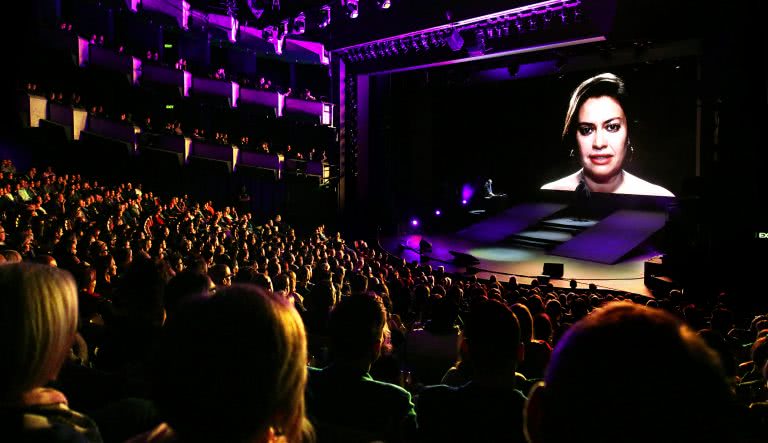Reviewed on Friday May 27 (photo by Prudence Upton)
On the first of four appearances at the Sydney Opera House for Vivid LIVE, Anohni, with Oneohtrix Point Never’s Daniel Lopatin and Christopher Elms in tow, presents the pitch-black Hopelessness in a take-it-or-leave-it proposition that aims to stir emotion but mostly numbs.
There’s a cold, distant feeling to the proceedings – Lopatin and Elms are set up in the back corners of the stage, blending into the background. Anohni herself, after singing the opening title number offstage, appears in a black hood with a black veil over her face, staying mainly at the back while delivering her vocals. As a result, the audience’s attention is directed at the giant screen that overlooks the stage, the sole purpose of which is displaying an extreme close-up of a variety of women, occasionally crying while loosely miming each song.
The source material is heavy going – Anohni tackles drone warfare, Isis, indifference to climate change, government surveillance, et cetera – and presented live through a screen you can’t turn away from, these themes are even more blunt and confronting. Instead of any nods to Anohni’s past incarnation as Antony and The Johnsons, the set is filled out with a few new songs. They feature the same intricate, dazzling electronica heard on the album, and the same relentless tone – “Jesus will kill you” goes one song’s chorus, another describes little girls getting raped in a line and having sticks forcibly inserted from “anus to mouth”.
For 90 minutes straight with no respite, even the biggest fan of Hopelessness would be hard-pressed not to find it draining. The show is closer to performance art than music. As impressive as the sound beds Lopatin produces are, he doesn’t stray too far from the record in the live setting. Anohni herself possesses a one-of-a-kind voice, and its power is hard to diminish. But harmonising with a variety of cued samples of her own voice comes close to doing just that (and beneath that black veil, there’s still a chance she’s not onstage at all).
The biggest problem, however, is that while she should be praised for tackling such uncomfortable material, Anohni doesn’t offer any form of solution. She doesn’t say a word to the crowd the entire night, leaving us with just the demoralising lyrics. Being the cult figure she is, it seems unlikely that any of the subject matter would be news to anyone in the audience – everyone is on board. Instead of fuelling the crowd’s anger at the world’s injustices and calling us to action, Anohni blames the audience itself, leaving a heavy feeling of, well, helplessness. Which is no doubt the point, but what does that accomplish?


































